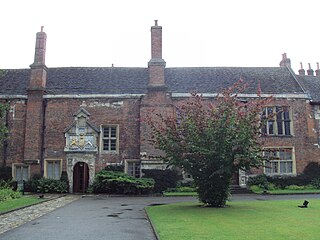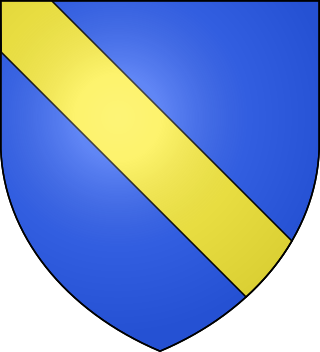Year 1405 (MCDV) was a common year starting on Thursday of the Julian calendar, the 1405th year of the Common Era (CE) and Anno Domini (AD) designations, the 405th year of the 2nd millennium, the 5th year of the 15th century, and the 6th year of the 1400s decade.

The House of Lancaster was a cadet branch of the royal House of Plantagenet. The first house was created when King Henry III of England created the Earldom of Lancaster—from which the house was named—for his second son Edmund Crouchback in 1267. Edmund had already been created Earl of Leicester in 1265 and was granted the lands and privileges of Simon de Montfort, 6th Earl of Leicester, after de Montfort's death and attainder at the end of the Second Barons' War. When Edmund's son Thomas, 2nd Earl of Lancaster, inherited his father-in-law's estates and title of Earl of Lincoln he became at a stroke the most powerful nobleman in England, with lands throughout the kingdom and the ability to raise vast private armies to wield power at national and local levels. This brought him—and Henry, his younger brother—into conflict with their cousin King Edward II, leading to Thomas's execution. Henry inherited Thomas's titles and he and his son, who was also called Henry, gave loyal service to Edward's son King Edward III.

Thomas Wentworth, 1st Earl of Strafford,, was an English statesman and a major figure in the period leading up to the English Civil War. He served in Parliament and was a supporter of King Charles I. From 1632 to 1640 he was Lord Deputy of Ireland, where he established a strong authoritarian rule. Recalled to England, he became a leading advisor to the King, attempting to strengthen the royal position against Parliament. When Parliament condemned Lord Strafford to death, Charles reluctantly signed the death warrant and Strafford was executed. He had been advanced several times in the Peerage of England during his career, being created 1st Baron Wentworth in 1628, 1st Viscount Wentworth in late 1628 or early 1629, and, finally, 1st Earl of Strafford in January 1640. He was known as Sir Thomas Wentworth, 2nd Baronet, between 1614 and 1628.

Thomas Howard, 3rd Duke of Norfolk, was a prominent English politician and nobleman of the Tudor era. He was an uncle of two of the wives of King Henry VIII, Anne Boleyn and Catherine Howard, both of whom were beheaded, and played a major role in the machinations affecting these royal marriages. After falling from favour in 1546, he was stripped of his dukedom and imprisoned in the Tower of London, avoiding execution when Henry VIII died on 28 January 1547.

The Council of the North was an administrative body first set up in 1484 by King Richard III of England, to improve access to conciliar justice in Northern England. This built upon steps by King Edward IV of England in delegating authority in the north to Richard, duke of Gloucester, and in establishing the Council of Wales and the Marches.

Ralph Neville, 1st Earl of WestmorlandEarl Marshal, was an English nobleman of the House of Neville.

Anthony Ashley Cooper, 1st Earl of Shaftesbury PC, FRS, was an English statesman and peer. He held senior political office under both the Commonwealth of England and Charles II, serving as Chancellor of the Exchequer from 1661 to 1672 and Lord Chancellor from 1672 to 1673. During the Exclusion Crisis, Shaftesbury headed the movement to bar the Catholic heir, James II, from the royal succession, which is often seen as the origin of the Whig party. He was also a patron of the political philosopher John Locke, with whom Shaftesbury collaborated with in writing the Fundamental Constitutions of Carolina in 1669.

The Exclusion Crisis ran from 1679 until 1681 in the reign of King Charles II of England, Scotland and Ireland. Three Exclusion Bills sought to exclude the King's brother and heir presumptive, James, Duke of York, from the thrones of England, Scotland and Ireland because he was a Roman Catholic. None became law. Two new parties formed. The Tories were opposed to this exclusion, while the "Country Party", who were soon to be called the Whigs, supported it. While the matter of James's exclusion was not decided in Parliament during Charles's reign, it would come to a head only three years after James took the throne, when he was deposed in the Glorious Revolution of 1688. Finally, the Act of Settlement 1701 decided definitively that Roman Catholics were to be excluded from the English, Scottish, and Irish thrones, later the British throne.
In English criminal law, attainder was the metaphorical "stain" or "corruption of blood" which arose from being condemned for a serious capital crime. It entailed losing not only one's life, property and hereditary titles, but typically also the right to pass them on to one's heirs. Anyone condemned of capital crimes could be attainted.

Colonel Adrian Scrope was a Parliamentarian soldier during the Wars of the Three Kingdoms, and one of those who signed the death warrant for Charles I in January 1649. Despite being promised immunity after the Restoration in 1660, he was condemned as a regicide and executed in October.
Scrope is the name of an old English family of Norman origin that first came into prominence in the 14th century. The family has held the noble titles of Baron Scrope of Masham, Baron Scrope of Bolton, and for a brief time, the Earl of Wiltshire.

William le Scrope, Earl of Wiltshire, King of Mann was a close supporter of King Richard II of England. He was a second son of Richard le Scrope, 1st Baron Scrope of Bolton.

Henry Scrope, 3rd Baron Scrope of Masham KG, also known in older sources as Lord Scrope was a favourite of Henry V, who performed many diplomatic missions. He was beheaded for his involvement in the notional Southampton Plot to assassinate the king. Some historians believe that the charge was trumped-up to punish him for other acts of disloyalty, and that there may never have been such a plot.
Sir Geoffrey le Scrope was an English lawyer, and Chief Justice of the King's Bench for four periods between 1324 and 1338.
Events from the 1400s in England.
Thomas Bardolf, 5th Baron Bardolf was an English baron who was the Lord of Wormegay in Norfolk, of Shelford and Stoke Bardolph in Nottinghamshire, and of Hallaton (Hallughton) in Leicestershire, among others, and was "a person of especial eminence in his time".

Richard le Scrope, 1st Baron Scrope of Bolton was an English soldier and courtier, serving Richard II of England. He also fought under Edward the Black Prince at the Battle of Crecy in 1346.
Sir Walter Beauchamp was an English lawyer who was Speaker of the House of Commons of England between March and May 1416.

The King of Mann was the title taken between 1237 and 1504 by the various rulers, both sovereign and suzerain, over the Kingdom of Mann – the Isle of Man which is located in the Irish Sea, at the centre of the British Isles. Since 1504, the head of state has been known as the Lord of Mann.
Richard le Scrope was an English cleric who served as Bishop of Coventry and Lichfield and Archbishop of York and was executed in 1405 for his participation in the Northern Rising against King Henry IV.











